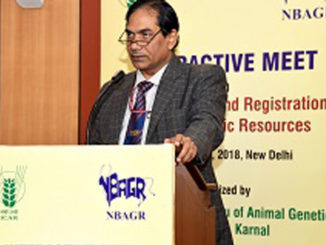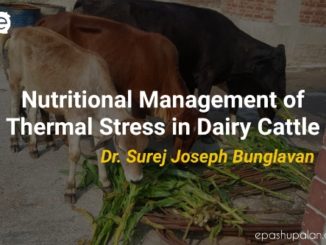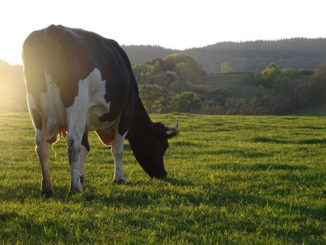Methane is a potent greenhouse gas (GHG) and it represents approximately 30% of the global anthropogenic GHG emission. India has 192, 109, 74 and 148 million cattle, buffalo, sheep, and goats, respectively. Methane gas is produced during the anaerobic fermentation in the rumen. Methane, which is emitted when ruminants belch, is the second most common GHG on the planet but its effect on the atmosphere is about thirty times more harmful than that of CO2. A recent estimate confirmed that cattle, buffaloes, sheep, and goats contribute 56, 29, 5 and 10% to the annual enteric methane emission respectively, in India, In addition to global warming, methane emission from the livestock is also accountable for a substantial energy loss (6-12% of the energy intake). In India, annually, about 38×108 Giga calorie energy is wasted from the livestock due to methane emission alone.
Keeping these points in view, a team of researchers led by the Director of ICAR-National Institute of Animal Nutrition and Physiology, Bengaluru Dr Raghavendra Bhatta initiated comprehensive and systematic research to develop farmers’ friendly and economically viable technologies for the methane amelioration from livestock.

The tamarind (Tamarindus indica, common name in Hindi Imli) is grown in more than 50 countries worldwide. India alone annually produces more than 98 thousand metric tons of tamarind. The tamarind seed is roasted to remove the outer covering (dark brown in colour) and the inside white coloured seed is used for extraction of starch. Tamarind seed husk is an agricultural waste and constitutes 35% of the decorticated seed. Generally, it is used as a manure and sometimes biomass fuel in replacement to wood and any other alternate biomass fuels. The tamarind seed husk contains 13-15% of tannins (a natural polyphenolic compound) and highly effective in the modulation of rumen fermentation. The tamarind seed husk is relatively inexpensive and costs only Rs. 3-4 per kilogram. Systematic studies in different livestock species have established that a reduction of about 17-20% in enteric methane emission is achievable by inclusion of tamarind seed husk in the ruminant diet, without any adverse effect. Further, this saved biological energy (methane energy) is being utilized for productive functions such as milk and body weight (meat).
Now, ICAR-NIANP has got the patent on the use of Tamarind seed husk to ameliorate enteric methane emission in ruminants. This will be a giant step towards reducing the enteric methane emission in livestock, through this ‘Green Technology’ and a classic example of ‘Waste to Wealth’.







Be the first to comment